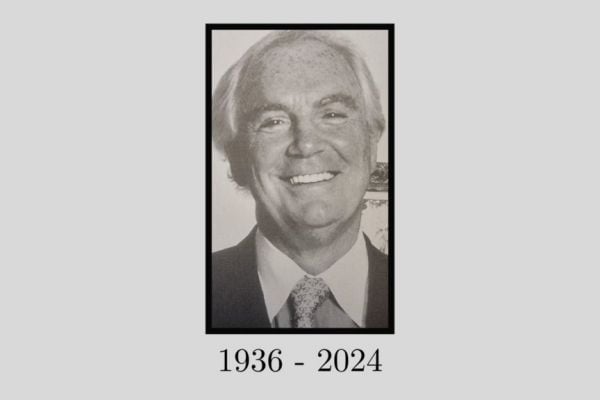Sir Anthony (Tony) O’Reilly, who passed away at the age of 88, was, in many ways, a one-off – a titan of both the sporting and business worlds, one of few Irishmen to earn a knighthood (for services to Northern Ireland), a trailblazer in the world of media, co-founder of the Ireland Funds, and a charming raconteur.
His exploits on the rugby field alone are legendary, earning his first cap for Ireland at the age of just 18, in 1955, scoring a total of 38 tries for the British & Irish Lions across two tours – a record that stands to this day – and racking up 30 appearances (and 38 tries) for the Barbarians – achievements that earned him a deserved place in the International Rugby Hall of Fame.
His 36 years at the Independent News & Media group, which he headed up from 1973 to 2009, led to him becoming a billionaire, while his visionary efforts in the food industry deserve particular praise, establishing Ireland’s reputation for quality on a global level.
Having worked as a management consultant in the UK and for Sutton’s of Cork, in 1962, the then 26-year-old O’Reilly took up the role of general manager of An Bord Bainne, the Irish Dairy Board, and set to work creating a brand that would become a synonym for dairy excellence around the world: Kerrygold butter.
Launched initially in the UK, and then in other European and international markets – it has been the number-one butter brand in Germany since 1973 – today Kerrygold is rivalled by perhaps only Guinness as the Irish food or drink brand best known internationally.
In a statement following his death, Ornua – the former Irish Dairy Board – praised O’Reilly for taking what was a commodity category and turning it into a transformative brand with global appeal.
‘This vision would define the future of the industry, bringing Irish food to a world stage and great joy to millions of consumers in markets around the world, as well as supporting the livelihoods of Irish dairy farming families across rural Ireland,’ it noted.
And O’Reilly didn’t stop with Kerrygold, either. In 1966, he was named managing director of the Irish Sugar Company, another state agency, transforming the nascent Erin Foods wing of the business (established by General Michael J Costello in 1960) into Ireland’s most-celebrated convenience food brand.
A joint marketing deal between Erin Foods and Heinz in the UK led to the Pittsburgh-based food giant taking a keen interest in the young Irish upstart, and in 1969, O’Reilly shunned the offer of the position of Irish Minister for Agriculture to take charge of Heinz’s UK operations, before joining the group’s US business two years later.
Initially taking the role of senior vice-president in charge of North American operations, in 1972, O’Reilly was named Heinz’s chief operating officer, rising to the role of CEO in 1979, following the retirement of Robert Burt Gookin. He was also named chairman of the business in 1987, becoming the first non-Heinz family member to hold the position.
A 1981 profile in The New York Times portrayed the then 45-year-old as a pragmatic leader of Heinz, concentrating the group’s efforts on its everyday essentials, righting its financial challenges, and taking a more methodical approach to mergers and acquisitions.
Quoted in the article, Barry Ziegler, vice-president of investment bank Bache Halsey Stuart Shields, said that under O’Reilly’s leadership, Heinz had the “strongest momentum of any of the food companies” – one that was maintained for well over the decade that followed.
As to whether O’Reilly himself – an international jet-setter before the term came into common usage – planned to take his stateside learnings back to Ireland with him, he told the paper, ‘‘I have no interest in going back. The corporate game is here in America. So if I want to stay in business, I’ll stay in the United States.’’
While O’Reilly spent much of his life outside of Ireland, his loyalty to his motherland influenced all his business and social endeavours.
“Every time I achieve something or fail to achieve something, I feel the weight of being a representative of the hopes and aspirations and dreams of Irish round the world,” he once put it – a quote that featured in his Guardian obituary.
In 1998, O’Reilly left Heinz to concentrate on his efforts outside of food, including Independent News & Media, Waterford Wedgwood, the Fitzwilton investment firm, Providence Resources, and his role in the Valentia consortium, which bought into telephony firm Eircom in 2001.
His charitable initiatives, chiefly the Ireland Funds, which sought to foster peaceful relations between the Catholic and Protestant communities in Northern Ireland, were similarly groundbreaking, raising more than $500 million for community projects.
Commenting on his passing, Kevin Kelly, chairman of Checkout Publications, said, "Tony O’Reilly was an extraordinary talent.
"At Tony's request, I had the great privilege with Sam Stephenson, a fellow Belvederian, to help create the Ireland Fund of Great Britain which has done marvellous work in celebrating the wonderful contribution of Irish people from all walks of life in the UK.
"Tony O’Reilly was an amazing operator. He was a classic example of the best of the Irish."
Once described by Henry Kissinger as “a modern renaissance man”, O’Reilly’s legacy, particularly in the world of food, is that he was among a small cohort of individuals who helped transform Ireland from a social backwater into a global player – a ‘son of Erin’, the likes of which we’re unlikely to see again.
Sir Anthony (Tony) O’Reilly, born 7 May 1936, died 18 May 2024.






